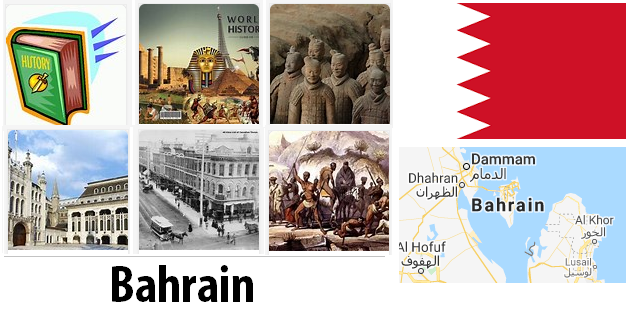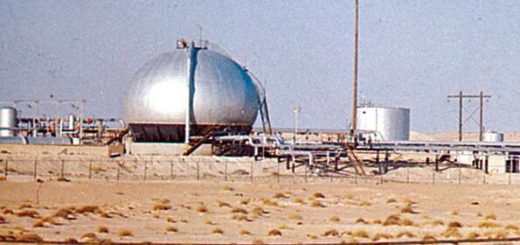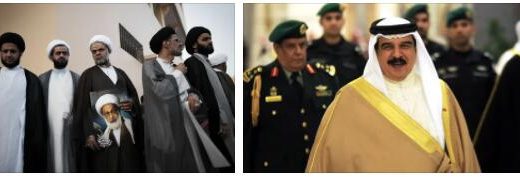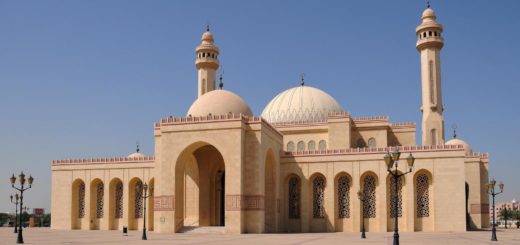Bahrain Recent History
Group of islands on the west coast of the Persian Gulf, with the capital Manamah. The name of these islands means in Arabic: “the two seas”. That they were inhabited since ancient times have shown us particular two-storey tombs, built with square stones, attributed to the Phoenicians who, as Herodotus handed down to us, emigrated to Syria from the Persian Gulf. Later these islands were known to the Assyrians and this data was also reached through literary works, in particular by Pliny. In these islands the spread of Islamism met with very strong resistance, indeed, there were refugee heretics refugees from Carmania, ancient province of the Persian Empire.
From 1507 and for more than a century, the Portuguese occupied it and established a stopover for India. After them came the Turks, who imposed a sultan on them, but in reality who had possession of these islands was the Persian empire, which kept them from 1735 to 1784. The British then replaced the Persians by applying their protectorate on the islands,
Later, in 1927, the sovereignty of Persia was reaffirmed immediately after the signing of the treaty between the United Kingdom and Saudi Arabia; sovereignty reaffirmed on several occasions.
According to Abbreviationfinder, an acronym site which also features history of Bahrain, the importance of these islands, as well as economic, was strategic, as the seat of a British airline Cairo-Basra-Karaci and because it was the seat of oil wells that were granted to the Standard Oil Company at the time.
But Persia, now Iran, continued negotiations with Britain to claim its sovereignty over this land, without however deteriorating its relations between the two countries.
In the years 1953/54 there were street demonstrations hostile to the British. These uprisings were supported by Persia which in 1957 proclaimed Bahrain as its 14th region. And this decision was rejected not only by the sultanate, present in the territory, but also by Great Britain which, both in November 1957, as in November 1958, reiterated the continuation of its protectorate on Bahrain, an independent state.
The government of Saudi Arabia also rose up against Iranian claims, claiming that Bahrain must have its independence as a culturally and geographically Arab state. Iraq was also associated with this statement.
In 1960 there was an issue of own stamps on the islands and in 1965 there was also a currency of its own: the dinar. Then in May 1970 the issue of Bahrain’s independence was definitively resolved as Persia accepted the United Nations resolution. These, in fact, had previously sent particular agents to the islands with the task of verifying the orientation of the population towards their independence.
On August 14, 1971 there was the official proclamation and the new state also concluded a pact of friendship with Great Britain. In September he joined the United Nations and the Arab League.
In December 1972 the Constituent Assembly was elected and in June 1973 the Constitution was officially promulgated. It guaranteed freedom and, in addition, primary education and free health care to all citizens.
A Chamber was formed, made up of 44 members which, however, was short-lived because, following disagreements that arose with the government, in 1975 it was dissolved. The main thrust of the discord was the failure to approve a law, proposed the year before, by which prison for three years was suspected for suspected crimes without first having made them appear before the court.
At the end of 1974, Saudi Arabia lobbied to join a federation with Qatar, but this proposal was accepted rather coldly. And after the dissolution of the Chamber, other unrest took place, of a religious nature: the majority of the Shiite population came into conflict with the aforementioned dynasty of the ruling emirate. The tensions then increased with the radicalization of the Islamic revolution and then the repercussions of the Iran-Iraq war had again. In the following years 1980/82 the demonstrations were repeated, however condemned by the authorities.
In 1986, the then vice-president of the United States, George Bush, visited the islands during a trip to the East and after that considerable military supplies arrived on site. But this visit also had a precise meaning. It was to be a warning to Qatar who, just at that time, was preparing to take over the island of Fasht Al-Dibat. The crisis then also resolved with the intervention of Saudi Arabia.
In foreign policy, Bahrain always practiced substantial alignment with moderate Arab currents, re-established diplomatic relations with Egypt in 1987 and was in the anti-Iraqi coalition during the 1991 conflict. In fact, during this period, he granted military bases to the British armed forces and Americans.
Parallel to this, opposition movements to the government developed in the country; Above all, the restoration of the Legislative Assembly, which had been suspended since 1975, was asked for. The freedom to organize parties and unions and the presence of women in public life were asked. These requests were rejected, but in December 1992 an advisory council of 30 members was established.
In 1994, with the sharp rise in unemployment, heavy clashes occurred between demonstrators and police. Guilty of the unrest were considered the Shiites, increasingly in contrast to the above-mentioned emirate, to whose rescue Saudi Arabia sent an army of 4,000 National Guard men.
Popular attempts to restore the Legislative Assembly continued, but the government, in response to multiple petitions, simply made a simple reshuffle of the executive in June 1995.
In 1996 the unrest continued; there was an attack on some immigrants from Bangladesh; the Shiites, always held responsible, underwent real persecutions.
With the intent to restore order, the Emir received the support not only of Saudi Arabia but also of Pakistan, Egypt, Syria and Jordan, as well as Great Britain and the United States, traditional enemies of the Iran, protector of Shiites.
With tensions eased, relations between Iran improved between 1997 and 1998 and a visit to Bahrain by former Iranian President Rafsangani contributed greatly to the reconciliation of the two countries.




